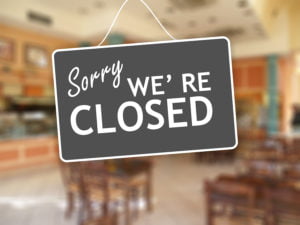
Sorry we are closed sign hanging on a glass storefront
In the first part of this blog I discussed what types of business are unlikely ever to sell and what you can do to extract maximum value. Now. Let’s assume that the day has come for you to close down, realise the assets, pay the bills and walk away into the sunset.
Closing down a business is time consuming and emotionally draining for the owners. In most cases, they will be walking away from their life’s work. If your business has reached a certain size, it’s likely you will need help from a trusted advisor who should project manage the process for you, the owner. Bear in mind, the owner will have a much-increased workload dealing with customers, suppliers, staff, financiers, tax authorities and the many specialists who need to be involved. The many specialists involved mean the owner should meet with:
- registered insolvency practitioners and liquidators to understand the administrative and legal processes of closing down the business, and run a “beauty parade” to select the appropriate adviser
- legal advisors and ensure best advice is obtained prior to close down, particularly in relation to contract terminations to ensure minimum costs of exit
- the accountants and tax specialists to ensure the process of close down is properly understood well in advance
- the bankers and financiers to ensure they are kept in the picture and that all guarantees and sureties will be extinguished when borrowings are settled, or if they are not settled, what the new terms will be
- asset valuers and auctioneers to understand the fair market value of plant and equipment or real estate and the necessary repairs and maintenance needed to maximise value when sold and the channel to market (by auction, advertising, e-bay etc)
- HR advisors to understand and document the processes necessary for making redundancies and dismissing staff in keeping with owners wishes and the legal requirements
- pension advisors relating to any company pension scheme for employees to ensure this is properly handled when the business closes down.

The analysis of the financial information in the check book.
These steps should be taken well in advance of the closure target as “proper planning prevents poor performance” and the margins for error in close down are quite slim. There is usually a greater capability for a close down to cost money unnecessarily if key details are left unplanned and surprise issues arise late in the day. Having consulted with the specialists listed above a detailed checklist should be drawn up.
Please feel free to get in touch with Peter Kroeger to discuss your options for exit.
